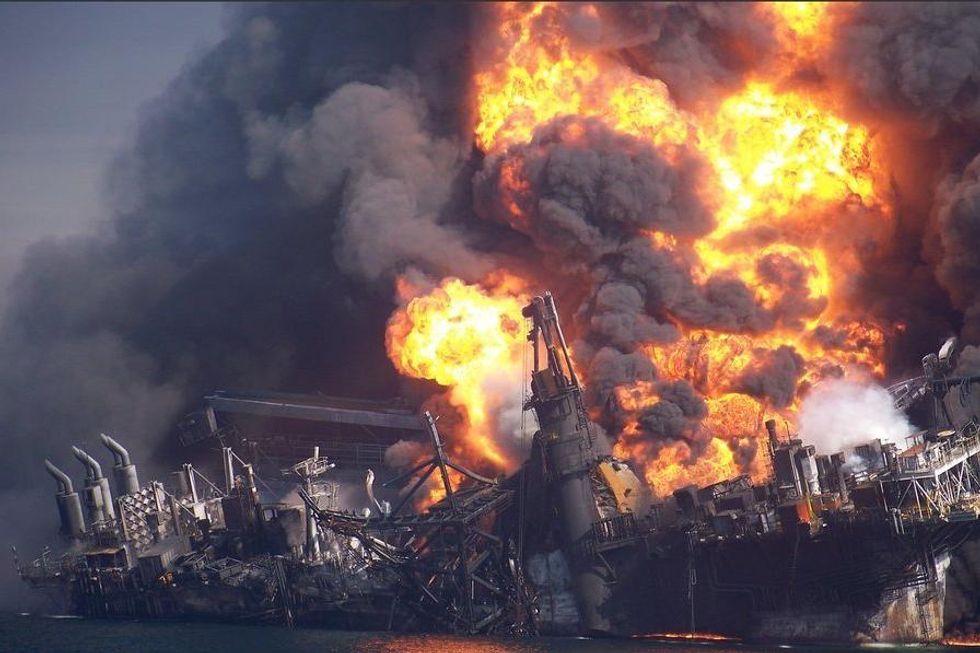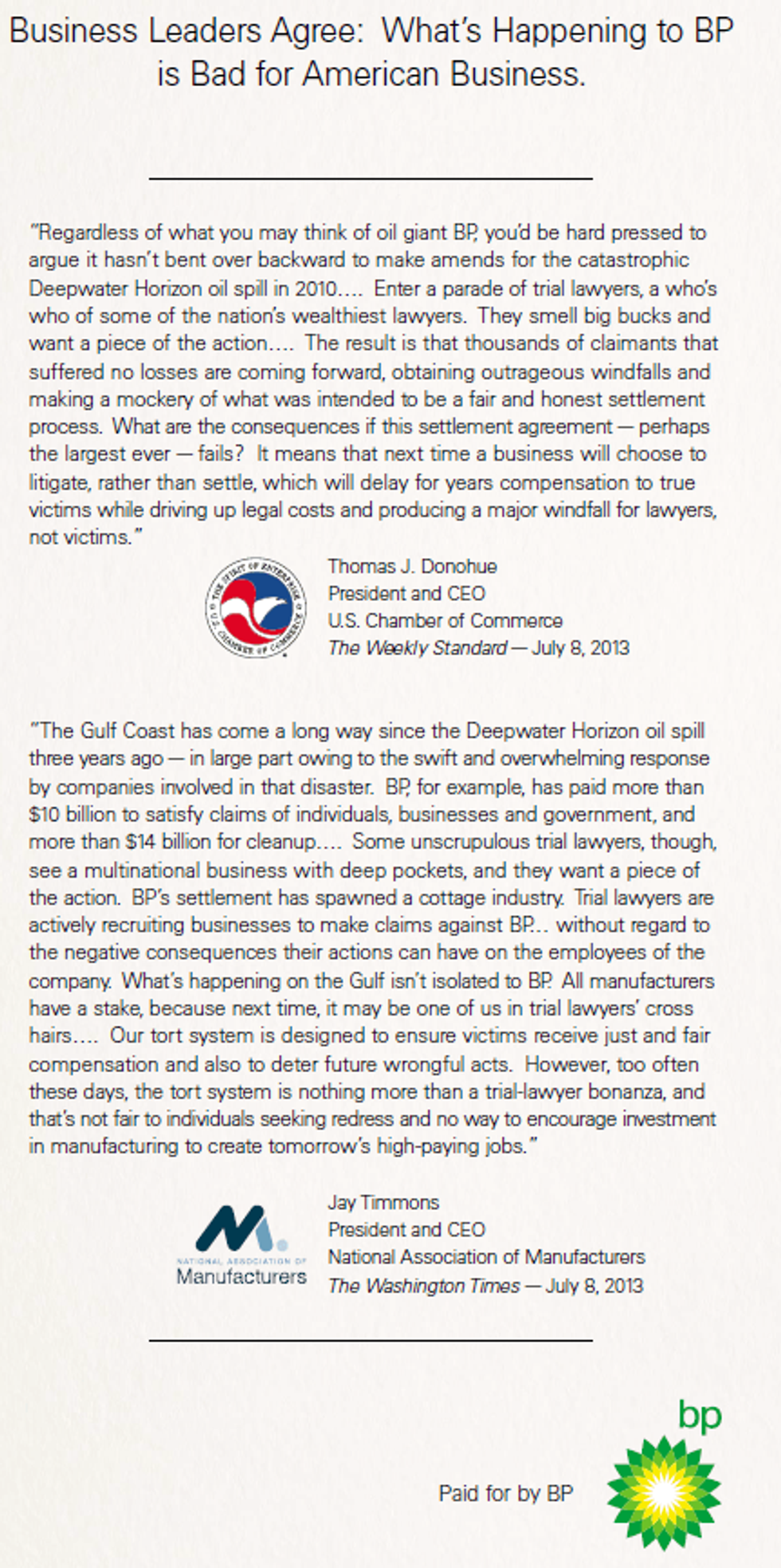

SUBSCRIBE TO OUR FREE NEWSLETTER
Daily news & progressive opinion—funded by the people, not the corporations—delivered straight to your inbox.
5
#000000
#FFFFFF
To donate by check, phone, or other method, see our More Ways to Give page.


Daily news & progressive opinion—funded by the people, not the corporations—delivered straight to your inbox.

Among those most angered by the BP-sponsored ad? The actual victims of the region's worst ever environmental disaster.
The ad, featuring comments from both the US Chamber of Commerce and the National Association of Manufacturers, criticizes the process by which local residents, small-business owners, and impacted communities have been compensated. Saying that BP "had bent over backwards to make amends for the catastrophe" the letter from the Chamber's CEO Thomas Donahue says that in the future, businesses will be smart to "litigate" rather than "settle" with communities following industrial disasters.
"Outrageous," said Aaron Viles, deputy director of the Gulf Restoration Network, which works to support the communities and Gulf ecosystems so devastated by the 2010 disaster that gushed an estimated 5 million barrels of crude oil into the ocean.
According to Viles, making big business out to be the victim is absurd. "BP and their team of lawyers signed off on this deal, and now they are crying foul? The truth of the matter is that BP's historic release of oil and application of toxic dispersant made the Gulf and our communities the victims," he said. "BP needs to follow through on their commitment to our coast."
Here's the ad:

Describing the ad--a clear example of big oil rallying its industry friends to provide it public relations backing--the Wall Street Journal's Tom Gara calls it
... one part of a multi-front effort by the oil giant to push back against the mountain of compensation claims it is facing from Gulf Coast residents and businesses over the 2010 Deepwater Horizon oil spill. On one hand, it has fought through the courts, challenging fraudulent claims and appealing against the process that awards compensation to victims.
By why now? And why bring in the Chamber and the NAM to speak on their behalf? According to Gara:
In short, [BP] is realizing the payouts it will be forced to make over the 2010 spill will be gigantic: Back in April, it said it expects total payouts to be "significantly higher" than the $8.2 billion it had estimated.
Part of the problem is that in the wake of the spill, it was so desperate to calm the firestorm of criticism -- recall at the time, some believed the crisis could be the end of BP as we knew it -- that it got itself into a compensation process that is turning out to be even more generous with payouts than it expected.
But Viles that's not how the real victims in the region--the people and the wildlife so devastating by the oil's destructive impact--see it.
"BP's oil is still here, and so it's only appropriate that they are still signing checks," he said. "This is a part of a clear pattern of BP doing everything possible to win the PR battle and convince the world that they are making things right. They aren't."
__________________________________
Dear Common Dreams reader, The U.S. is on a fast track to authoritarianism like nothing I've ever seen. Meanwhile, corporate news outlets are utterly capitulating to Trump, twisting their coverage to avoid drawing his ire while lining up to stuff cash in his pockets. That's why I believe that Common Dreams is doing the best and most consequential reporting that we've ever done. Our small but mighty team is a progressive reporting powerhouse, covering the news every day that the corporate media never will. Our mission has always been simple: To inform. To inspire. And to ignite change for the common good. Now here's the key piece that I want all our readers to understand: None of this would be possible without your financial support. That's not just some fundraising cliche. It's the absolute and literal truth. We don't accept corporate advertising and never will. We don't have a paywall because we don't think people should be blocked from critical news based on their ability to pay. Everything we do is funded by the donations of readers like you. Will you donate now to help power the nonprofit, independent reporting of Common Dreams? Thank you for being a vital member of our community. Together, we can keep independent journalism alive when it’s needed most. - Craig Brown, Co-founder |

Among those most angered by the BP-sponsored ad? The actual victims of the region's worst ever environmental disaster.
The ad, featuring comments from both the US Chamber of Commerce and the National Association of Manufacturers, criticizes the process by which local residents, small-business owners, and impacted communities have been compensated. Saying that BP "had bent over backwards to make amends for the catastrophe" the letter from the Chamber's CEO Thomas Donahue says that in the future, businesses will be smart to "litigate" rather than "settle" with communities following industrial disasters.
"Outrageous," said Aaron Viles, deputy director of the Gulf Restoration Network, which works to support the communities and Gulf ecosystems so devastated by the 2010 disaster that gushed an estimated 5 million barrels of crude oil into the ocean.
According to Viles, making big business out to be the victim is absurd. "BP and their team of lawyers signed off on this deal, and now they are crying foul? The truth of the matter is that BP's historic release of oil and application of toxic dispersant made the Gulf and our communities the victims," he said. "BP needs to follow through on their commitment to our coast."
Here's the ad:

Describing the ad--a clear example of big oil rallying its industry friends to provide it public relations backing--the Wall Street Journal's Tom Gara calls it
... one part of a multi-front effort by the oil giant to push back against the mountain of compensation claims it is facing from Gulf Coast residents and businesses over the 2010 Deepwater Horizon oil spill. On one hand, it has fought through the courts, challenging fraudulent claims and appealing against the process that awards compensation to victims.
By why now? And why bring in the Chamber and the NAM to speak on their behalf? According to Gara:
In short, [BP] is realizing the payouts it will be forced to make over the 2010 spill will be gigantic: Back in April, it said it expects total payouts to be "significantly higher" than the $8.2 billion it had estimated.
Part of the problem is that in the wake of the spill, it was so desperate to calm the firestorm of criticism -- recall at the time, some believed the crisis could be the end of BP as we knew it -- that it got itself into a compensation process that is turning out to be even more generous with payouts than it expected.
But Viles that's not how the real victims in the region--the people and the wildlife so devastating by the oil's destructive impact--see it.
"BP's oil is still here, and so it's only appropriate that they are still signing checks," he said. "This is a part of a clear pattern of BP doing everything possible to win the PR battle and convince the world that they are making things right. They aren't."
__________________________________

Among those most angered by the BP-sponsored ad? The actual victims of the region's worst ever environmental disaster.
The ad, featuring comments from both the US Chamber of Commerce and the National Association of Manufacturers, criticizes the process by which local residents, small-business owners, and impacted communities have been compensated. Saying that BP "had bent over backwards to make amends for the catastrophe" the letter from the Chamber's CEO Thomas Donahue says that in the future, businesses will be smart to "litigate" rather than "settle" with communities following industrial disasters.
"Outrageous," said Aaron Viles, deputy director of the Gulf Restoration Network, which works to support the communities and Gulf ecosystems so devastated by the 2010 disaster that gushed an estimated 5 million barrels of crude oil into the ocean.
According to Viles, making big business out to be the victim is absurd. "BP and their team of lawyers signed off on this deal, and now they are crying foul? The truth of the matter is that BP's historic release of oil and application of toxic dispersant made the Gulf and our communities the victims," he said. "BP needs to follow through on their commitment to our coast."
Here's the ad:

Describing the ad--a clear example of big oil rallying its industry friends to provide it public relations backing--the Wall Street Journal's Tom Gara calls it
... one part of a multi-front effort by the oil giant to push back against the mountain of compensation claims it is facing from Gulf Coast residents and businesses over the 2010 Deepwater Horizon oil spill. On one hand, it has fought through the courts, challenging fraudulent claims and appealing against the process that awards compensation to victims.
By why now? And why bring in the Chamber and the NAM to speak on their behalf? According to Gara:
In short, [BP] is realizing the payouts it will be forced to make over the 2010 spill will be gigantic: Back in April, it said it expects total payouts to be "significantly higher" than the $8.2 billion it had estimated.
Part of the problem is that in the wake of the spill, it was so desperate to calm the firestorm of criticism -- recall at the time, some believed the crisis could be the end of BP as we knew it -- that it got itself into a compensation process that is turning out to be even more generous with payouts than it expected.
But Viles that's not how the real victims in the region--the people and the wildlife so devastating by the oil's destructive impact--see it.
"BP's oil is still here, and so it's only appropriate that they are still signing checks," he said. "This is a part of a clear pattern of BP doing everything possible to win the PR battle and convince the world that they are making things right. They aren't."
__________________________________